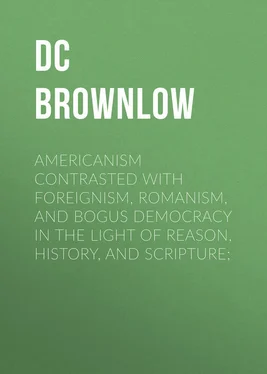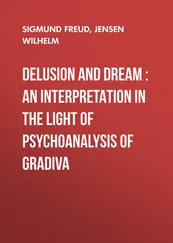William Brownlow - Americanism Contrasted with Foreignism, Romanism, and Bogus Democracy in the Light of Reason, History, and Scripture;
Здесь есть возможность читать онлайн «William Brownlow - Americanism Contrasted with Foreignism, Romanism, and Bogus Democracy in the Light of Reason, History, and Scripture;» — ознакомительный отрывок электронной книги совершенно бесплатно, а после прочтения отрывка купить полную версию. В некоторых случаях можно слушать аудио, скачать через торрент в формате fb2 и присутствует краткое содержание. Жанр: foreign_antique, foreign_prose, на английском языке. Описание произведения, (предисловие) а так же отзывы посетителей доступны на портале библиотеки ЛибКат.
- Название:Americanism Contrasted with Foreignism, Romanism, and Bogus Democracy in the Light of Reason, History, and Scripture;
- Автор:
- Жанр:
- Год:неизвестен
- ISBN:нет данных
- Рейтинг книги:3 / 5. Голосов: 1
-
Избранное:Добавить в избранное
- Отзывы:
-
Ваша оценка:
- 60
- 1
- 2
- 3
- 4
- 5
Americanism Contrasted with Foreignism, Romanism, and Bogus Democracy in the Light of Reason, History, and Scripture;: краткое содержание, описание и аннотация
Предлагаем к чтению аннотацию, описание, краткое содержание или предисловие (зависит от того, что написал сам автор книги «Americanism Contrasted with Foreignism, Romanism, and Bogus Democracy in the Light of Reason, History, and Scripture;»). Если вы не нашли необходимую информацию о книге — напишите в комментариях, мы постараемся отыскать её.
Americanism Contrasted with Foreignism, Romanism, and Bogus Democracy in the Light of Reason, History, and Scripture; — читать онлайн ознакомительный отрывок
Ниже представлен текст книги, разбитый по страницам. Система сохранения места последней прочитанной страницы, позволяет с удобством читать онлайн бесплатно книгу «Americanism Contrasted with Foreignism, Romanism, and Bogus Democracy in the Light of Reason, History, and Scripture;», без необходимости каждый раз заново искать на чём Вы остановились. Поставьте закладку, и сможете в любой момент перейти на страницу, на которой закончили чтение.
Интервал:
Закладка:
"But are there no inconveniences to be thrown into the scale against the advantage expected from a multiplication of numbers by the importation of foreigners? It is for the happiness of those united in society to harmonize, as much as possible, in matters which they must of necessity transact together. Civil government being the sole object of forming societies, its administration must be conducted by common consent. Every species of government has specific principles. Ours, perhaps, are more peculiar than those of any other in the universe. It is a composition of the freest principles of the English constitution, with others derived from natural right and natural reason. To these nothing can be more opposed than the maxims of absolute monarchs. Yet from such we are to expect the greatest number of immigrants . They will bring with them the principles of the government they leave, imbibed in early youth : or, if able to throw them off, it will be in exchange for an unbounded licentiousness, passing, as is usual, from one extreme to another. It would be a miracle were they to stop precisely at the point of temperate liberty . These principles, with their language, they will transmit to their children. In proportion with their numbers, they will share with us the legislation. They will infuse into it their spirit, warp and bias its directions, and render it a heterogeneous, incoherent, distracted mass. I may appeal to experience during the present contest for a verification of these conjectures. But if they be not certain in event, are they not possible? are they not probable? Is it not safer to wait with patience twenty-seven years and three months longer for the attainment of every degree of population desired or expected? May not our government be more homogeneous, more peaceable, more durable?"
Again, Mr. Jefferson, whilst our Minister to the Court of St. Cloud, addressed a letter to John Jay, dated November 14, 1788, in which he uses this language:
"With respect to the Consular appointments, it is a duty on me to add some observations, which my situation here has enabled me to make. I think it was in the spring of 1784, that Congress (harassed by multiplied applications from foreigners, of whom nothing was known but on their information, or on that of others as unknown as themselves) came to the resolution that the interest of America would not permit the naming of any person, not a citizen, to the office of Consul, or Agent, or Commissary. Native citizens, on several valuable accounts, are preferable to aliens, or citizens alien-born. Native citizens possess our language, know our laws, customs and commerce, have general acquaintance in the United States, give better satisfaction, and are more to be relied on in a point of fidelity . To avail ourselves of our native citizens, it appears to me advisable to declare, by standing law , that no person but a native citizen shall be capable of the office of Consul. This was the rule of 1784, restraining the office of Consul to native citizens."
In 1797, Mr. Jefferson drafted a petition to the Legislature of Virginia, on behalf of the citizens of Amherst, Albemarle, Fluvana, and Gouchland Bounties, in which he uses the following language:
"Your petitioners further submit to the two Houses of Assembly, whether the safety of the citizens of this Commonwealth, in their persons, their property, their laws and government, does not require that the capacity to act in the important office of Juror, Grand or Petty, civil or criminal , should not be restrained in future to native citizens, or such as were citizens at the date of the Treaty of Peace which closed our revolutionary war; and whether ignorance of our laws, and natural partiality to the countries of their birth, are not reasonable causes for declaring this to be one of their rights incommunicable in future to adopted citizens." — Jefferson's Writings, Vol. IX., page 453.
Now, Sir, answer me in candor, are you not ashamed of having quoted Mr. Jefferson, and of having so basely misrepresented his position on this great American question? Did not Mr. Jefferson propose to carry his opposition to foreigners much farther than the American party now do?
But, you vile old demagogue, though "son of a now sainted father," I am determined you shall not escape the indignant powers of those "Bishops, Elders, and other Ministers," whom you have wickedly sought to deceive. It is known to you, and to the world, in what veneration all American Democrats hold the Virginia Resolutions of 1798 and '99, and the fame of Mr. Madison, who was the ruling spirit of that session of the Legislature. That Legislature passed the following Resolution, which you may find by consulting Henning's Statutes at Large, Vol. 2, New Series, page 194:
"That the General Assembly, nevertheless, concurring in opinion with the Legislature of Massachusetts that every Constitutional barrier should be opposed to the introduction of foreign influence into our National Councils, — Resolved , That the Constitution ought to be so amended that no foreigner, who shall have acquired the right, under our Constitution and laws, at the time of making the amendment, shall hereafter be eligible to the office of Senator or Representative , in Congress of the United States, nor to any office in the Judiciary or Executive . Agreed to by the Senate, Jan. 16, 1799."
I shall next consider two extracts from your Address, under one general head, relating to the temporal power of the Pope. You say:
"But the genius of sophistry may fly to the rescue of Know-Nothingism, by pretending that it is not on account of his religion that the Catholic is to be excluded from office, but because he is subjected, not merely to the spiritual but the temporal dominion or jurisdiction of the Pope. No error has been wider spread than this."
Again:
"A late distinguished Senator from Georgia, (Mr. Berrien,) in a recent address to the public, has copied a letter of Mr. Wesley, which may require a few observations. That letter was dated in January, 1780. All its conclusions were founded on the assumed and popular opinion of that day, that the Pope did claim a civil jurisdiction beyond his own dominions – that he could absolve the subjects of other governments from their oaths of allegiance, and that there was a principle in one of the tenets of that Church, that Catholics were justified in not keeping faith with heretics. Against these assumed and popular opinions, the Catholics of England in that day, as they now do in this country, were solemnly protesting."
This is a modest way of giving Mr. Wesley the lie , but it is nevertheless quite direct , and is the more surprising, as it comes from the "son of a now sainted father," who was a follower of Wesley, a "co-laborer of that noble band of Christian ministers" he was instrumental in starting out into the world – aye, the son of a "father who, for forty years, ministered at the altars" this same Wesley erected! In holding up John Wesley as the vile calumniator of the Catholic Church in England, it is well enough, Governor, to be modest about it, and cautious in the selection of your words, as you are addressing a class of men who believe in John Wesley, as a faithful man of God, and one incapable of misrepresenting the Catholics of England, the Pope of Rome, or any other sect or individual! John Wesley ministered at the sacred altars of religion for more than sixty years; he had with him the power of God, and the witness that he pleased Him; and the last words he uttered, with his hands clasped, and his eyes raised toward heaven, were these: " The best of all is, God is with us! " And yet the sons and grandsons in the gospel, of this venerated and sainted man of God, are insulted in Tennessee, by being told by an impertinent old sinner , and a vile old party hack , that he was A LIAR, while living, and the slanderer of the Catholic Church , now that he is no more! If Mr. Wesley " assumed " falsehoods in reference to the Romish Church in England, he either did it in ignorance , or with a guilty knowledge of the fact. He was a man of too much learning and information for his friends to get him out of such an indictment under a plea of ignorance. He is therefore, though dead, a wilful liar, according to "Ex-Gov. A. V. Brown," for the Governor goes on to argue the cause against him, and, on page 19 of his address, quotes Catholic authority to prove him a liar! Shame on the "son of a now sainted father," and on the holy seer of Pisgah ! O! Aaron, thou priest of corrupt Democracy, you need not endeavor to gull "bishops, elders, and other ministers," with your whining cant , while you thus traduce their great spiritual head, who, under God, taught them the lessons of salvation!
Читать дальшеИнтервал:
Закладка:
Похожие книги на «Americanism Contrasted with Foreignism, Romanism, and Bogus Democracy in the Light of Reason, History, and Scripture;»
Представляем Вашему вниманию похожие книги на «Americanism Contrasted with Foreignism, Romanism, and Bogus Democracy in the Light of Reason, History, and Scripture;» списком для выбора. Мы отобрали схожую по названию и смыслу литературу в надежде предоставить читателям больше вариантов отыскать новые, интересные, ещё непрочитанные произведения.
Обсуждение, отзывы о книге «Americanism Contrasted with Foreignism, Romanism, and Bogus Democracy in the Light of Reason, History, and Scripture;» и просто собственные мнения читателей. Оставьте ваши комментарии, напишите, что Вы думаете о произведении, его смысле или главных героях. Укажите что конкретно понравилось, а что нет, и почему Вы так считаете.












